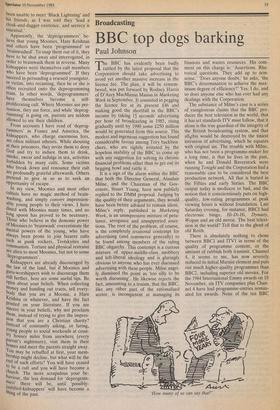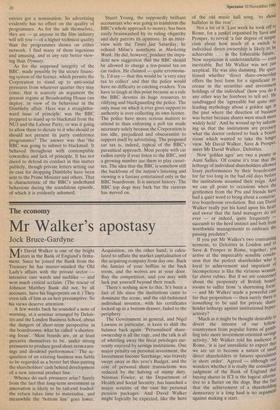Broadcasting
BBC top dogs barking
Paul Johnson
The BBC has evidently been badly rattled by the latest proposal that the Corporation should take advertising to avoid yet another massive increase in the licence fee. The plan, it will be remem- bered, was put forward by Rodney Harris of D'Arcy MacManus Masius in Marketing Week in September. It consisted in pegging the licence fee at its present £.46 and making good the shortfall in the BBC's income by taking 15 seconds' advertising per hour of broadcasting in 1985, rising gradually until by 1990 some £250 million would be generated from this source. This, modest and ingenious suggestion has found considerable favour among Tory backben- chers, who are rightly irritated by the hopeless inability of the BBC to come up with any suggestion for solving its chronic financial problems other than to get out its begging bowl and rattle it.
It is a sign of the alarm within the BBC that both the Director General, Alasdair Milne, and the Chairman of the Gov- ernors, Stuart Young, have now publicly replied to the DMM proposal. Judging by the quality of their arguments, they would have been better advised to remain silent. Milne's reply, published in Marketing Week, is an unimpressive mixture of petu- lance, arrogance and unsupported asser- tions. The root of the problem, of course, is the completely irrational contempt for advertising (and commerce generally) to be found among members of the ruling BBC oligarchy. This contempt is a curious mixture of upper-middle-class snobbery and left-liberal ideology and is glaringly obvious to anyone who has ever discussed advertising with these people. Milne angri- ly dismissed the point as 'too silly to be worth discussing'. He likewise rejects the fact, amounting to a truism, that the BBC, like any other part of the rationalised sector, is incompetent at managing its
finances and wastes resources. His com- ment on this charge is: 'Assertions. Rhe- torical questions. They add up to non- sense.' Does anyone doubt,' he asks, 'the BBC's determination to achieve the max- imum degree of efficiency?' Yes: I do, and so does anyone else who has ever had any dealings with the Corporation.
The substance of Milne's case is a series of vainglorious claims that the BBC pro- duces the best television in the world, that it has set standards ITV must follow, that it alone is the true guardian of the integrity of the British broadcasting system, and that alllithis would be destroyed by the tiniest intrusion of advertising, which he equates with original sin. The trouble with Milne, who has not been a programme-maker for a long time, is that he lives in the past, when he and Donald Baverstock were running Tonight and the Corporation had a reasonable case to be considered the best production network. All that is buried in the Fifties and early Sixties. The BBC output today is mediocre to bad, and the notion that it conscientiously puts on high- quality, low-rating programmes at peak viewing hours is without foundation. Last Saturday evening, for instance, BBCI had electronic bingo, Hi-Di-Hi, Dynasty, 4Vogan and an old movie. The best televi- sion in the world? Tell that to the ghost of old Reith.
There is absolutely nothing to chose between BBC1 and ITV1 in terms of the quality of programme content, or the amount of rubbish both transmit. Channel 4, it seems to me, has now severely reduced its initial Marxist element and puts out much higher-quality programmes than BBC2, including superior old movies. For the 1984 International Emmy awards on 19 November, six ITV companies plus Chan- nel 4 have had programme-entries nomin- ated for awards. None of the ten BBC 'How many of us can say that?'
entries got a nomination. So advertising evidently has no effect on the quality of programmes. As for the ads themselves, they are — as anyone in the film industry will tell you — of a higher technical quality than the programmes shown on either network. I find many of them ingenious and amusing, and at any rate better view- ing than Dynasty.
As for the supposed integrity of the BBC, made possible by the secure financ- ing system of the licence, which permits the Corporation to stand up to anti-social pressures from whatever quarter they may come, that is scarcely an argument the present regime at Broadcasting House can deploy, in view of its behaviour in the Dimbleby affair. Here was a straightfor- ward issue of principle: was the BBC prepared to stand up to blackmail from the NUJ and the Labour Party, or was it going to allow them to dictate to it who should or should not present its party conference programmes? The answer was that the BBC was going to submit to blackmail. It behaved throughout with contemptible cowardice and lack of principle. It has not dared to defend its conduct in this matter publicly, though private letters setting out its case for dropping Dimbleby have been sent to the Prime Minister and others. That is characteristic of the BBC's underhand behaviour during the scandalous episode, of which it is evidently ashamed.
Stuart Young, the supposedly brilliant accountant who was going to transform the BBC's whole approach to money, has been easily brainwashed by its ruling oligarchy and duly parrots its opinions. In an inter- view with the Times last Saturday, he echoed Milne's assertions in Marketing Week. He did, however, produce the impu- dent new suggestion that the BBC should be allowed to charge a ten-pound tax on car radios. He claimed — quite erroneous- ly, I'd say — that this would be 'a very easy tax to collect' and that the police would have no difficulty in catching evaders. You have to laugh at this point because as a rule the BBC devotes its huge resources to vilifying and blackguarding the police. The only issue on which it ever gives support to authority is over collecting its own licence. The police have more serious matters to attend to than enforcing a poll tax made necessary solely because the Corporation is too idle, prejudiced and obscurantist to support itself by advertising. The proposed car tax is, indeed, typical of the BBC's parasitical approach. Most people with car radios rarely if ever listen to the BBC, and a growing number use them to play casset- tes. The idea that the BBC is somehow still the backbone of the nation's listening and viewing is a fantasy entertained only in the BBC boardroom. It is ancient history. The BBC top dogs may bark but the caravan has moved on.















































 Previous page
Previous page